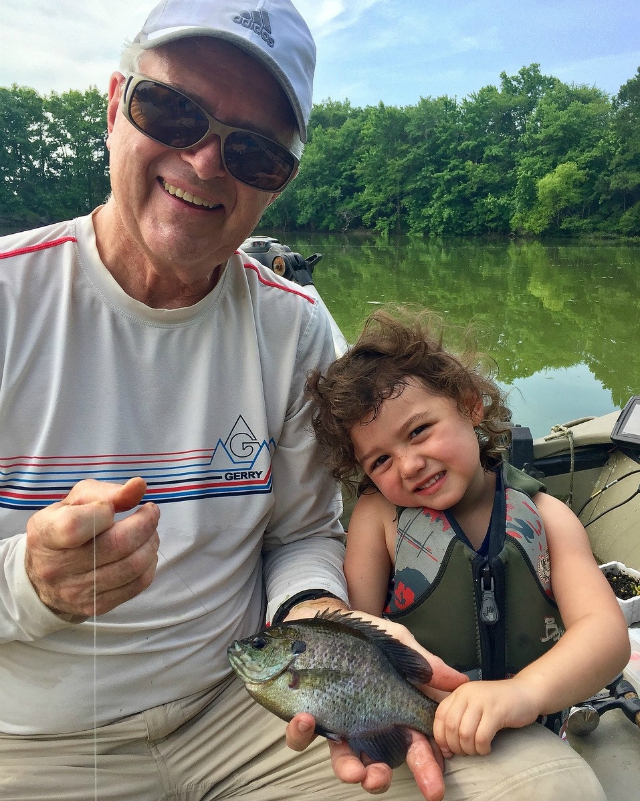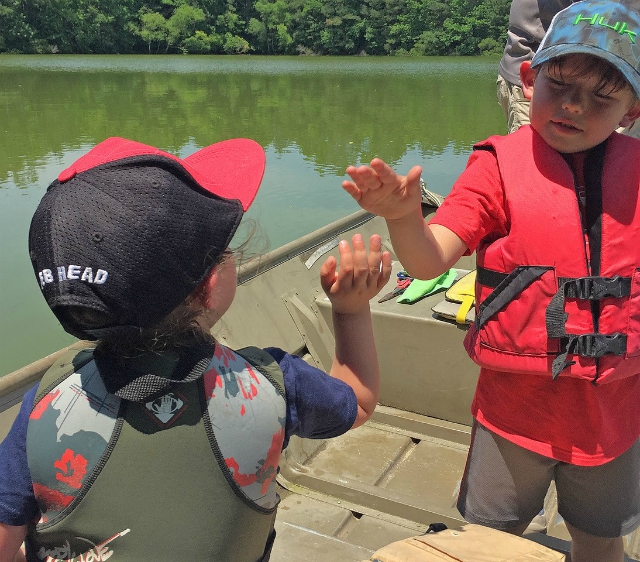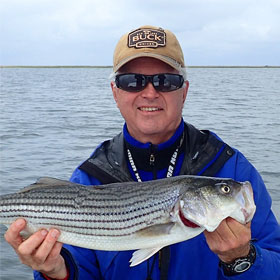A Grandfather’s Advice on Taking Young Kids Fishing
By Ken Schultz
Jul 31, 2018
Ken Schultz addresses the topics of what age to start young kids fishing, what time of day to go, when to stop, personal comfort, bass and sunfish, and fish handling.
My children and their families live a long way from my home. The grandkids are young, and when they visit I make sure to take them fishing. Right now, it’s simple stuff, using bait and floats for bass and panfish. Recently my daughter, Megan, and her 5-year-old-son, Gabe, and almost 3-year-old daughter, Rory, visited and I took them pond fishing on two successive mornings.
Gabe has caught fish with me before, usually just the two of us. He’s eager, and loves it. But this time, his sister, who wants to do everything that he’s doing, joined us for her first-ever fishing experience, and there was a new dynamic, one that included sharing.


Megan came along and was responsible for the most important thing that any kids fishing outing must have: food and beverages they like. It’s almost a certainty that children will be hungry or thirsty a few minutes into an outing, so you cannot minimize this. Beverages, of course, are especially important in hot weather.
That was important on our outing, as we were experiencing a heat wave. We had no choice for various reasons but to start mid-morning on the first day. This is not my preference in the summer and in hot weather, but Gabe was so eager that we decided to go anyway and storms were forecast for later days. Lots of action will generally overcome discomfort, but fishing early at this time is often better for achieving action and for personal comfort. Since children must wear PFDs while in a boat, this can add to their hot-weather discomfort, but if they’re accustomed to wearing PFDs from past boating experiences, this is less likely to be an issue.
The question often comes up as to when kids can start fishing. It depends on the child, of course. Gabe hasn’t learned casting yet, but at 5 he could if we had enough practice time. He can reel small fish in on his own as long as the tackle is set up right. At 3, and a first-timer, Rory can barely hold a light rod, and can’t be trusted to keep a grip on a rod being pulled by a fish. So she needs assistance. Of course, kids would like to do things themselves, and should as soon as they’re able. But they can watch a float (bobber), and will get excited when it dips or disappears. Thus, we fished minnows on small circle hooks for bass, and worms on long-shanked J hooks for sunfish. I placed the baits in position, they watched for activity (when they weren’t eating, drinking, or playing with the minnows and worms).


On the second day we got an earlier start, but the heat and humidity was such that we sought refuge in shade whenever we could. That was better for the fish, too, because that’s where we caught most of the bass, bluegills, and shellcrackers. We didn’t catch a lot either outing - about six fish over two hours each trip - but Rory managed her first bass, bluegill, and shellcracker, and was always quite aware as to who’s turn it was to land the next fish.
If it was cooler, and if the action had been fast, we might have stayed longer, but if you want children to enjoy angling, it’s self-defeating to push them. Stop fishing when they want to stop, which is when they’re too hot (or cold or wet), or bored.
Here are two other pieces of advice for taking kids fishing. First, encourage but don’t insist, that they handle the fish or touch them. They will if and when they want to. Despite being a first-timer, Rory was more interested in touching and holding than her brother. Let them release their fish, if they want to.
Second, most kids at first want to keep what they catch, or at least the larger specimens. My rule is that we don’t keep what we won’t eat. You must be willing to eat it if you want to keep it. Many youngsters don’t like eating fish, so they waver when this rule is explained. My niece, when she was young, hated to eat fish but wanted to keep her catch. She agreed to eat it, and surprisingly found that she liked it, much to her mother’s chagrin (although she’d only eat the fish that she caught and that I cooked). Sometimes I let kids keep a fish for a while in the livewell so they can admire it a bit longer without having it flop on the floor or be mishandled. Then we let it go. That’s not feasible in hot weather.
After fishing, we celebrated Gabe and Rory’s catches by going to an ice cream shop. Some may call that a payoff or bribery, but I call it positive reinforcement, another important element of taking kids fishing.









